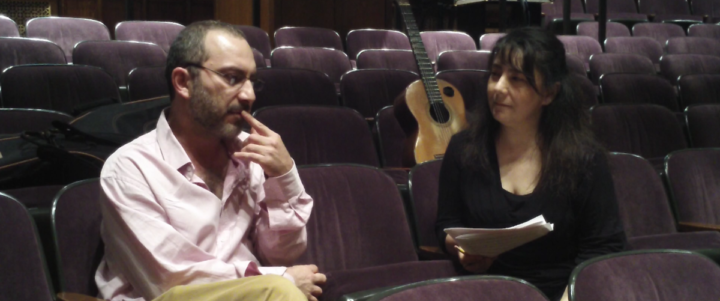“My music is a voyage of self-discovery. In every piece I ponder deeper inside my self, a self which is, of course, social. Every piece has to be a window for something beyond music.” – Carlos José Castro, composer
In preparation for her premiere of Castro’s Nocturno, flutist Laura Falzon discussed several aspects of this new work with the composer himself. She explored with him his intentions and what he had in mind when he created this new work. More so, she discussed several compositional aspects of his works and how he approaches a new piece.
LF: How do you compose? Do you jot down ideas and then develop them later?
CC: I usually compose a sketch of the whole piece before writing a note. This sketch is a melodic shape, [whether] I do it just in my head, or takes the form of a guitar piece, or both. In the case of this piece I worked on the melody by singing it … until it became a whole.
LF: Where do your ideas come from? What inspires you to write music? Do you find inspiration from other composers or perhaps you get inspiration from nature, art, and literature?
CC: My ideas come from very different interests. The avatars of personal experience, nature, literature, arts, drama and, of course, other musics. Also the mythic dimension is important to me. I believe music is a path and a channel to truths beyond language.
LF: Are there any particular influences on your music?
CC: I take from everywhere, from Latin popular music, rock, folklore from all over the world, minimalism, expressionism, African tribal music, romanticism, classicism, protest songs, all kinds of jazz, Bach, et al. I don’t believe in barriers, musically speaking, and try in my musical language to integrate as many dialects as possible. I believe that this gives me the chance to express better the human experience.
LF: How would you describe your music?
CC: My music is a voyage of self-discovery. In every piece I ponder deeper inside my self, a self which is, of course, social. Every piece has to be a window for something beyond music. The melody is a very important part of my music. I believe that musical themes are meant to be remembered and treasured. Rhythm has to be vital. I like details and craftsmanship. Polyphony is ever present, even in a single line. Modality, tonality, atonality, classicism, romanticism, modernism, minimalism, impressionism, all coexist in my music.
LF: Do you tailor works towards a particular audience or do you write works with particular musicians in mind as interpreters of your music?
CC: A composer has to be aware for whom he writes and in what context. That’s essential. But the end result is always my personal voyage under those circumstances.
LF: What inspired you to write Nocturno?
CC: A personal loss. The necessity to let go.
LF: Is there a particular reason why you chose to write this work for alto flute?
CC: The alto flute has a dark tone and register perfectly suited for the rendering of the particular expression of the melody.
LF: Is Nocturno inspired or based on anything in particular? How would you describe the piece?
CC: The same melodic shape is repeated and varied a few times keeping the same tonal center (A) but changing the scale of reference. There is always a relation between the tonic A and the note immediately over it B. At the end of the piece the tonic is removed leaving a sense of loss.

